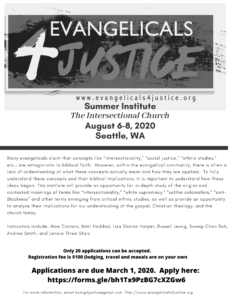Indigenous Peoples and Christian Nationalism by Lenore Three Stars
- Evangelicals 4 Justice
- Apr, 19, 2022
- Blog
- No Comments
Thanks to Daniel Hill, I understand that American Nationalism is a sense of exalted national consciousness, as superior and exceptional, and ordained by God. In America, nationalism is race based – it is fused to whiteness that asserts racial superiority over all who are non-white.
As I considered these thoughts, I had to wonder whether Indigenous nationalism exists in this country.
The reason for this relates to Soong-Chan Rah’s discussion about how human experience, and more so our theology, shapes our imagination of how we relate to this world, and the possibilities of what the world might and should be. In my thinking, this theological imagination refers to my worldview, which includes my understanding of Creator God.
Scriptures tell us that we are related through Creator’s promise to bless the world through Abraham’s family, and that we are all adopted as children of God – so we are all related that way. In my Lakota worldview, Mitakuye Oyasin also holds that we are all related – to Creator, to each other, and to all creation, including the nonhuman parts of creation. All creation includes the land, so Unci Maka, grandmother earth, is my relative. She is not land that I own. The spiritual connection is so deep that we belong to the land, not the other way around. The Genesis creation story says that Adam was created from adamah, the earth, which also seems to say you belong to the land. You are dust and to dust you shall return.
In contrast, the song, “God bless America, land that I love” is about the power of a land-based nation, not about our kinship to Unci Maka. We love our ancestral lands but not with the sense of exceptionalism and superiority that is American Nationalism. And not with the diseased theological imagination that gives us the narrative of white supremacy.
Seeing the world, through the lens of interconnected relationship with all creation, a bigger world that reflects the fullness of Creator is possible. my theological imagination sees a world where diverse people groups believe they are related, interconnected and interdependent. We could unite without a nationalistic framework – without asserting superiority. If we were to move towards a more indigenous worldview of right relationship with the earth and each other, can nationalism exist on land that is our relative, not a power base. This thinking could break down the fusion of race-based American nationalism.
I need to give props to Dr Andrea Smith for her work, “Heteropatriarchy and the Three Pillars of White Supremacy.” Christians of color could unite in solidarity around a shared oppression, since white supremacy harms us in different ways. What commonality behind anti-Blackness also oppresses Native Americans and Asian communities? White non-Christians and Christians of color could work with other oppressed people groups in contextual justice issues, such as environmental racism and housing justice. For me, as a Lakota woman, I need to be cognizant that when I help strategize against white supremacy in the Indigenous Land Back movement, I don’t allow myself to become complicit in keeping the system of whiteness in place by oppressing immigrant relatives.
Randy Woodley explained that white supremacy has been a part of this country before it was a country. Religion was used to justify the racism and economic greed of white settlers as they took land from the indigenous population. In my faith community, white Christians are working with Christians of color to expose the malicious ideology of the Doctrine of Discovery. The diseased theological imagination of the Church in the 15th century acted out from the narrative of white supremacy, even deciding who got to be human. The Popes sanctioned the subjugation, slavery, and murder of indigenous peoples on the grounds that they were not Christian and had no human rights. That narrative was brought to this country and was embedded as Manifest Destiny. That narrative is why I was born on a reservation.
After years of collaboration, our denomination voted to repudiate the Doctrine of Discovery. May we do this in a meaningful way, beginning with lament, repentance, and truth telling.
A good start would be to answer the question: Whose indigenous ancestral lands are you living in? What are the justice issues that they are struggling with? A good relative would reach out and strategize a way to stand with them in solidarity. We are all related. Love has a lot of work to do in our communities, and it performs its work through justice.
Follow us on Twitter: @Evang4Justice
Invalid or expired token.Summer Institute

Recent Posts
- Evangelical Perspectives on Israel and Palestine – by Rob Dalrymple
- Indigenous Peoples and Christian Nationalism by Lenore Three Stars
- Recognizing Nationalism by Andrew Cheung
- Ukraine: “Wars and rumors of wars”: a sign of the times, or a sign of all times? A Christian response by Rob Dalrymple
- E4J Annual Zoom Conference: From Conflict to Community, Feb 11-12, 2022